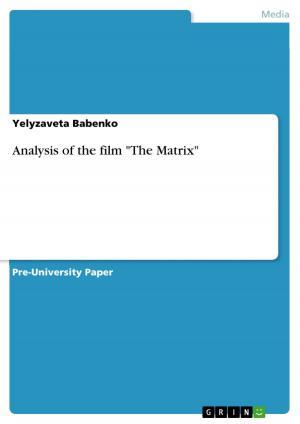| Author: | Richard Fuchs | ISBN: | 9783638178839 |
| Publisher: | GRIN Publishing | Publication: | March 26, 2003 |
| Imprint: | GRIN Publishing | Language: | English |
| Author: | Richard Fuchs |
| ISBN: | 9783638178839 |
| Publisher: | GRIN Publishing |
| Publication: | March 26, 2003 |
| Imprint: | GRIN Publishing |
| Language: | English |
Seminar paper from the year 2003 in the subject Politics - International Politics - Topic: Public International Law and Human Rights, grade: 1,0 (A), Western Michigan University (Department of Political Science), 33 entries in the bibliography, language: English, abstract: [...] The paper attempts to make this transatlantic conflict more transparent through a comparative analysis of U.S. and EU responses to the ICC. It provides historical knowledge about the ICC development from an unsettled idea to its final implementation, and it clarifies American and European National Interests behind the scenes. Within the analysis, American objections will be outlined and set in context with the European counter-arguments. The most controversial issues between the transatlantic partners including the prosecutorial powers, the question of immunity, the risk of politically motivated prosecutions as well as the rights of the accused in trial procedures will be at the heart of the debate. The paper works with the hypothesis that the ICC case constitutes a transatlantic clash of ideologies centering on a fundamentally different interpretation of national sovereignty. Whereas the European Union considers the ICC as an expansion of its national sovereignty and its sphere of influence, the U.S. views the same issue as an infringement of its Constitutional Rights (Macpherson & Kaufman, 2002, p. 220). Whereas the EU is in fear of a possible 'double standard' in International Human Rights Law, the U.S opposes 'automatism' in ICC jurisdiction as a result of its universality. For the EU, a 'double standard' in International Human Rights Law would occur, if American citizen were granted immunity without specification of time and conditions. For the US, the rejected 'automatism' is the Court's right to step in and take over a case under ICC jurisdiction if a trial is not preceded after the Rome Statute 'Rules of Procedure'. For the purpose of our research, the paper will start with the definition of State Sovereignty of Langley, which defines the multifaceted term as 'a fundamental concept of international law, defining the supreme authority of each state to make and enforce laws with respect to all property, events, institutions and persons within its borders' (Langley, 1999). I conclude that that we indeed can see in the ICC case study urgent evidence for an ideological gap between the EU and the US, because the main arguments on both sides can all be traced back to the underlying question, how national sovereignty is defined under the current Rome Statute, so that we have to redefine the above mentioned definition for the US, respectively for the EU.
Seminar paper from the year 2003 in the subject Politics - International Politics - Topic: Public International Law and Human Rights, grade: 1,0 (A), Western Michigan University (Department of Political Science), 33 entries in the bibliography, language: English, abstract: [...] The paper attempts to make this transatlantic conflict more transparent through a comparative analysis of U.S. and EU responses to the ICC. It provides historical knowledge about the ICC development from an unsettled idea to its final implementation, and it clarifies American and European National Interests behind the scenes. Within the analysis, American objections will be outlined and set in context with the European counter-arguments. The most controversial issues between the transatlantic partners including the prosecutorial powers, the question of immunity, the risk of politically motivated prosecutions as well as the rights of the accused in trial procedures will be at the heart of the debate. The paper works with the hypothesis that the ICC case constitutes a transatlantic clash of ideologies centering on a fundamentally different interpretation of national sovereignty. Whereas the European Union considers the ICC as an expansion of its national sovereignty and its sphere of influence, the U.S. views the same issue as an infringement of its Constitutional Rights (Macpherson & Kaufman, 2002, p. 220). Whereas the EU is in fear of a possible 'double standard' in International Human Rights Law, the U.S opposes 'automatism' in ICC jurisdiction as a result of its universality. For the EU, a 'double standard' in International Human Rights Law would occur, if American citizen were granted immunity without specification of time and conditions. For the US, the rejected 'automatism' is the Court's right to step in and take over a case under ICC jurisdiction if a trial is not preceded after the Rome Statute 'Rules of Procedure'. For the purpose of our research, the paper will start with the definition of State Sovereignty of Langley, which defines the multifaceted term as 'a fundamental concept of international law, defining the supreme authority of each state to make and enforce laws with respect to all property, events, institutions and persons within its borders' (Langley, 1999). I conclude that that we indeed can see in the ICC case study urgent evidence for an ideological gap between the EU and the US, because the main arguments on both sides can all be traced back to the underlying question, how national sovereignty is defined under the current Rome Statute, so that we have to redefine the above mentioned definition for the US, respectively for the EU.















